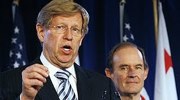A fascinating behind-the-scenes look at the federal court challenge to Prop 8
activism, lgbt, politics Add comments (1) An excellent article published in this month’s California Lawyer Magazine explores the origins of the federal court challenge to Proposition 8, aka Perry vs. Schwarzenegger, and how a group of Hollywood activists took on the fight to restore marriage equality, not just in the state of California, but nationwide. From the article:
An excellent article published in this month’s California Lawyer Magazine explores the origins of the federal court challenge to Proposition 8, aka Perry vs. Schwarzenegger, and how a group of Hollywood activists took on the fight to restore marriage equality, not just in the state of California, but nationwide. From the article:
As Chad Griffin tells it, the idea for filing a federal challenge to Prop. 8 took shape ten days after it passed with 52 percent of the vote. Griffin and Kristina Schake, his business partner in the Los Angeles communications firm Griffin/Schake, had joined director Rob Reiner and his wife, Michele, for lunch at the Polo Lounge in the Beverly Hills Hotel. Griffin had produced three television ads and raised money for the “No on 8” campaign; the Reiners were contributors, as well as Griffin’s longtime clients. The four discussed the failed campaign and other election results.
After Griffin left, an acquaintance of the Reiners, Kate Moulene, stopped by and learned that they had discussed Prop. 8. Moulene later phoned Michele Reiner to suggest they talk to her former brother-in-law, Ted Olson, because, she said, he supported gay marriage. Though Olson has a long history as a prominent Republican lawyer—he served in both the Reagan and George W. Bush administrations—his leanings tend to be more libertarian than socially conservative.
The Reiners phoned Griffin about contacting Olson. “I would have been crazy not to talk to him if it were true that such a prominent conservative and legal scholar was on our side,” Griffin says.
Because Olson’s involvement would be major news, secrecy was imperative. On November 21, a week after the Polo Lounge lunch, Griffin met Olson at Gibson Dunn’s Washington, D.C., office. There, Olson declared his interest in taking a case challenging the constitutionality of Prop. 8.
It was “terribly unfortunate” that Prop. 8 passed, Olson said, particularly because “Californians have always been in the forefront of liberty and individualism.” His own support for gay marriage, he said, dates back more than a decade.
The article goes on to detail much of the friction and the mending of fences between gay groups and those litigating the case.
Though spurned by the court, the LGBT legal groups chose to cooperate with the Perry team. They have provided background material that includes expert witnesses who had been used in other cases, and briefs from gay-rights litigation. “We are interested in doing whatever we can to make sure their case is as successful as possible,” says James Esseks, co-director of the ACLU’s LGBT Project. “And we wish the plaintiffs’ legal team the best. We know they’re doing everything they can to put together a great case.”
But does he support the litigation? “What I’d say is: We think they’ve got it right about the law,” Esseks replied. “We think that Prop. 8 violates the federal Constitution. We think that is crystal clear.”
The LGBT legal groups also agree that Olson’s involvement is a significant and positive development. Kendell says, “Seeing this person, who was a star of the conservative right, speaking out for the rights of LGBT couples to marry really did feel like, ‘Gosh, this really could help change people’s hearts and minds.’ ” In one of her early conference calls to discuss the complaint, Kendell jokingly named Olson an “honorary lesbian.”
It’s a long, but fascinating read. And definitely worth the time.